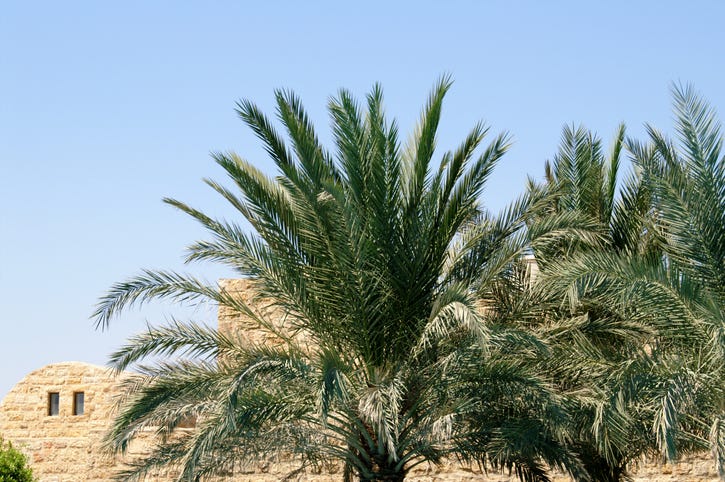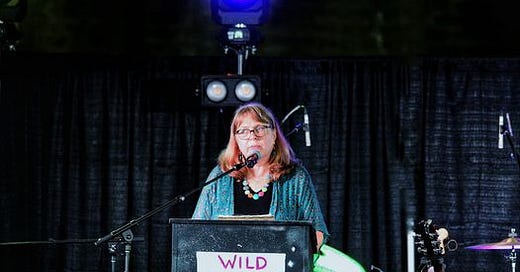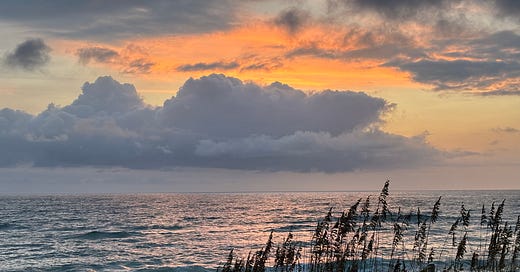
Discover more from The Cottage
Today is Palm Sunday, the beginning of the holiest week of the Christian year. In the next few days, Christians will commemorate, re-enact, and celebrate the final days of Jesus’ life and the empty tomb of Easter.
The lectionary text for the service of palms is from Matthew, and is accompanied by a selection from Psalm 118. I’ve added two verses from Zechariah, the Hebrew scripture quoted by the author of Matthew’s gospel.
Read on . . . ride on . . . join the procession of peace.
Matthew 21:1-11
When Jesus and his disciples had come near Jerusalem and had reached Bethphage, at the Mount of Olives, Jesus sent two disciples, saying to them, "Go into the village ahead of you, and immediately you will find a donkey tied, and a colt with her; untie them and bring them to me. If anyone says anything to you, just say this, `The Lord needs them.' And he will send them immediately." This took place to fulfill what had been spoken through the prophet, saying,
"Tell the daughter of Zion,
Look, your king is coming to you,
humble, and mounted on a donkey,
and on a colt, the foal of a donkey."
The disciples went and did as Jesus had directed them; they brought the donkey and the colt, and put their cloaks on them, and he sat on them. A very large crowd spread their cloaks on the road, and others cut branches from the trees and spread them on the road. The crowds that went ahead of him and that followed were shouting,
"Hosanna to the Son of David!
Blessed is the one who comes in the name of the Lord!
Hosanna in the highest heaven!"
When he entered Jerusalem, the whole city was in turmoil, asking, "Who is this?" The crowds were saying, "This is the prophet Jesus from Nazareth in Galilee."
Zechariah 9:9–10
Rejoice greatly, O daughter Zion! Shout aloud, O daughter Jerusalem! Lo, your king comes to you; triumphant and victorious is he, humble and riding on a donkey, on a colt, the foal of a donkey. He will cut off the chariot from Ephraim and the war horse from Jerusalem; and the battle bow shall be cut off, and he shall command peace to the nations; his dominion shall be from sea to sea, and from the River to the ends of the earth.
Psalm 118:1-2, 19-29
Confitemini Domino (Book of Common Prayer)
Give thanks to the Lord, for he is good;
his mercy endures for ever.
Let Israel now proclaim,
"His mercy endures for ever."
….Open for me the gates of righteousness;
I will enter them;
I will offer thanks to the Lord.
"This is the gate of the Lord;
he who is righteous may enter."
I will give thanks to you, for you answered me
and have become my salvation.
The same stone which the builders rejected
has become the chief cornerstone.
This is the Lord's doing,
and it is marvelous in our eyes.
On this day the Lord has acted;
we will rejoice and be glad in it.
Hosannah, Lord, hosannah!
Lord, send us now success.
Blessed is he who comes in the name of the Lord;
we bless you from the house of the Lord.
God is the Lord; he has shined upon us;
form a procession with branches up to the horns of the altar.
"You are my God, and I will thank you;
you are my God, and I will exalt you."
Give thanks to the Lord, for he is good;
his mercy endures for ever.
Being of a certain age, Palm Sunday always conjures memories of Jesus Christ Superstar. I owned the original Broadway soundtrack, an album with a simple brown cover with gold lettering that vaguely resembled a Bible. I knew all the words by heart, and especially loved the song of Jesus’ triumphal entry into Jerusalem:
Hosanna, hey sanna, sanna sanna ho
Sanna, hey, sanna hosanna
Hey J.C, J.C, won't you smile at me?
Sanna ho, sanna hey, Superstar
Like liturgical clockwork, as Lent comes to an end and Holy Week begins, I find myself humming it over dishes and belting it out in the car. Needless to say, I’ve sung it a lot this past week.
Not until recently did I realize that I didn’t actually know what “hosanna” meant. I’d always assumed it was a synonym for alleluia, an expression of praise. But hosanna and alleluia are not the same. Hōsanná is a transliteration of the Hebrew term (hôsî-âh-nā) meaning "Oh, save now!" or "Please save!"
The crowd at the procession wasn’t shouting praises to Jesus. The crowd was begging Jesus to save them.
From what?
In 2006, John Dominic Crossan and Marcus Borg published The Last Week. The book begins with an unforgettable image:
“Two processions entered Jerusalem on a spring day in the year 30. . . One was a peasant procession, the other an imperial procession. From the east, Jesus rode a donkey down the Mouth of Olives, cheered by his followers. . . On the opposite side of the city, from the west, Pontius Pilate, the Roman governor of Idumea, Judea, and Samaria, entered Jerusalem at the head of a column of imperial calvary and soldiers.
Jesus’s procession proclaimed the kingdom of God; Pilate’s proclaimed the power of empire.”
I’ve no idea how many thousands of sermons have been preached on this passage in the years since. In the last fifteen years, I’ve never not heard a Palm Sunday sermon allude to it, borrow the image, or quote it directly. The “two processions” have become nearly a commonplace in liturgical and liberal churches.
This year, I’ve wondered about the crowds watching the processions. Matthew depicts the throng cheering, waving branches, and singing hosanna. The author interlaced the Jesus procession with a prophecy from Zechariah. In the Hebrew scriptures, Zechariah envisioned a humble king who arrives in Jerusalem on a donkey and a colt. That king will end all war. No more chariots, warhorses, or battle-bows. This king commands peace.
Of course, Pontius Pilate wasn’t a king of peace. He commanded an army on behalf of Caesar. But he and that legion were there to keep the peace during the holy days of Passover — making sure the Jews caused no trouble for their Roman rulers. As his procession made its way to the city gate, most likely no one cheered him. The crowds hated and feared him.
Perhaps a few paid supporters were sent out to shout Ave Pilate — Hail Pilate — as he entered — to soothe his imperial ego. Maybe a few powerful people in Jerusalem actually approved of him, or wanted something from him, and shouted their praise. Chances are, however, the road to the west gate was relatively deserted as the Romans approached. The only sounds were the dreaded clomp, clomp of armored horses and chariot wheels traversing the cobblestones. Pilate, in regal splendor, probably wanted to be home in his seaside villa instead of here, with the unruly Jews.
Meanwhile, at the eastern gate, Jesus’ noisy supporters were crying out Hosanna! Save us! Please save us now! They weren’t asking for some sort of spiritual salvation, for a place in heaven, or for eternal life. They wanted to be saved from Pilate, from the legion entering the other gate, from Caesar, and that faux peace of Roman swords. They knew there was no Pax Romana, it was nothing but misery and death.
Hosanna Jesus! Free us, we pray you! Deliver us! Save us from Pilate and Caesar and the misery of Rome! Hosanna, hey sanna, sanna sanna ho! Now, Jesus, now!
There isn’t an ave or an alleluia to be heard. These branch-waving protesters were begging to be rescued from oppression and injustice, shouting for liberation from the forces of violence and death.
Palm Sunday has always confused me. When depicted as a jubilant crowd, it doesn’t make a lot of sense. But, if the crowd is understood as desperate subjects of a bloody empire, Palm Sunday comes into better focus. Why do they later turn on Jesus? Well, once the Roman soldiers enter the fray, and once their hoped-for savior is arrested, the reality of their situation sets in. No amount of hosannas can free Jesus from his Roman fate. But they could still save their own hides and hope for better when the next promising savior arrived. They didn’t really betray him. They did what fearful subjects of a brutal regime usually do — they capitulated to their overlords who had thousands of chariots, warhorses, and battle-bows at their command. The Romans essentially forced them into the imperial procession. By Friday, they weren’t begging Jesus for salvation; they were praying they could avoid being crucified with him.
We are frail people after all.
But Jesus will save them from violence and death — although not as anyone hoped or expected — by drinking Rome’s bloody cup. The journey to the anti-imperial kingdom will be marked by a cross. Palm Sunday is the first step along a way that will end with a stunning event in a cemetery garden.
And yet, even after the tomb: hosanna still sounds. In a week, we may shout our Easter Alleluias, but the truth is that our days cry out hosanna. Children and teachers die in pools of blood at school, lies pervade and divide a desperate people, the rich steal everyone’s share, courts unwind decades of justice, and even a poisoned earth and sky rage against us. Pax Americana? We may have believed that once, subject to its deceptive promises. But the mask comes off and a faux peace makes itself known. A peace enforced by fear and violence, a peace of privilege and guns. Hosanna, Jesus, hosanna! Save us, NOW!
Honestly, I’m stricken by the bodies and blood, the price of empire. I’ve got no aves or alleluias left. But I can wave my palm in protest, and I can still shout: Hosanna, hey sanna, sanna sanna ho / Sanna, hey, sanna hosanna!
And that chorus is needed now more than ever. The road to the eastern gate beckons, opening to the commonwealth of God. Sing with me.
Two processions entered Jerusalem on that day. The same question, the same alternative, faces those who would be faithful to Jesus today.
Which procession are we in? Which procession do we want to be in?
This is the question of Palm Sunday and of the week that is about to unfold.
— John Dominic Crossan and Marcus Borg, The Last Week
INSPIRATION
Eccentric tree,
lofty, lithe from spiny copse:
nearly shadeless rod
with razor fronds —
misfit wood.
Yet you alone from the stands of arboreal majesty
surrendered stalks
for fervid peasants waving hosanna
and carpeting grace.
Susurrating above the throng,
did you assist their supplication?
Did you bow in the breeze
as One rode by?
Perhaps that fleeting genuflect redeemed the weald,
for, unlike your kin whose more mundane timber gave
stake and beam,
you gifted glory.
— Diana Butler Bass, “For God So Loved the Weald”
That man’s too old to play Christ, someone said
when you appeared onstage — thirty years
in those white robes, spotlights tracking
your graceful sleeves, the attentive angle
of your head as you worked a crowd. I agreed
that you looked tired, but when Mary Magdalene
anointed you, when you cast merchants
and money changers from the temple, I forgot
your thinning hair and wrinkled brow, forgot
how your story ended: your broken voice
crying on the cross, your body arched as you
ascended. . .
Carrie Shipers, “Love Poem for Ted Neeley In Jesus Christ Superstar” please read the entire poem HERE.
Sing me your song but not for me alone
Sing out for yourselves for you are blessed
There is not one of you who cannot win the kingdom
The slow, the suffering
The quick, the dead
Hosanna, hey sanna, sanna sanna ho
Sanna hey, sanna ho sanna
— Andrew Lloyd-Webber, “Hosanna,” from Jesus Christ Superstar
And just because: Who can resist? The great Ted Neeley in the 1973 film, Jesus Christ Superstar.


















Today is Palm Sunday and I am marking 21 years in continuous sobriety from the slavery of alcoholism. Holy Week is about liberation for me and my gratitude is boundless.
...and there were some who thought Him a fool:
April Fool
You wear your heart on your sleeve
And though they laugh when they leave
You call it Love and I believe (you)
April Fool
Why must you always play the clown?
You had the edge you laid it down
You gave it up without a sound...
Oh April Fool
How can they say "love is cruel"?
They catch the ring but drop the jewel.
Like a teardrop in a pool...
April Fool
As the heart shows through the eyes
Before you were born you were recognized
And unto the losers comes their Prize.
Oh April Fool
Even as the hands were washed, you knew
We'd free the thief instead of you
April Fool
You said the Father was in You
You said we know not what we do
Forgive us...April Fool.
https://vimeo.com/401173658/4e42720f94